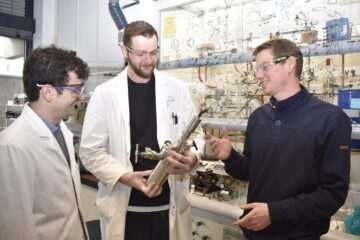Employee with sleeping disorder has to work extra hard

Dutch researcher Michel Varkevisser has discovered that chronic sleep complaints are associated with a reduced performance. This conclusion contradicts earlier findings. The researcher postulates that under normal daily circumstances, the lower performance level was probably not visible because the sleep sufferers invest extra energy in carrying out a task.
Research psychologist Michel Varkevisser investigated how sleeping problems affected the performances of employees under both laboratory and field conditions. In contrast to earlier findings, Varkevisser found that people who suffer from sleeping problems clearly performed less well when assessed under controlled laboratory conditions. This difference might be because Varkevisser is one of the few to have set up a completely-controlled laboratory experiment. In this set-up, posture, food intake and exposure to light were kept constant. Moreover the study subjects were not allowed to sleep over a 24-hour period.
After the controlled experiment, the researcher carried out a field study in which employees with several sleeping problems received a palmtop computer that contained three tests and a sleep diary. During this observation, the insomniacs reported a lot of subjective complaints such as tiredness, drowsiness, a worse mood and a reduced ability to concentrate. In contrast to the subjective complaints the researcher found no worsening in objective functioning.
The researcher concluded from this that if people with chronic sleeping complaints have to be self-reliant (under boring circumstances), they function less well. However under normal or semi-normal circumstances they can put extra effort into a task so that the performance level remains relatively high. As a result of this extra investment they seem to get on reasonably well at work but in the long term this has a detrimental effect on their physical well-being. Their mood worsens and they become excessively tired. This results in an increased chance of work absenteeism.
About 20 percent of the Dutch population regularly experience sleeping complaints and it is estimated that about 6 percent have chronic complaints. Interestingly sleeping problems are almost never considered as a possible causal factor in employee absenteeism. Moreover, many primary health care practitioners, such as GPs, company doctors, but also psychologists, do not consider sleeping problems to be a distinct disorder. Consequently they often fail to choose right treatment and do not refer the patient to a sleeping disorder centre on time.
Michel Varkevisser’s research was funded by NWO.
Media Contact
More Information:
http://www.nwo.nl/nwohome.nsf/pages/NWOP_6CVF97_EngAll latest news from the category: Health and Medicine
This subject area encompasses research and studies in the field of human medicine.
Among the wide-ranging list of topics covered here are anesthesiology, anatomy, surgery, human genetics, hygiene and environmental medicine, internal medicine, neurology, pharmacology, physiology, urology and dental medicine.
Newest articles

Lower dose of mpox vaccine is safe
… and generates six-week antibody response equivalent to standard regimen. Study highlights need for defined markers of mpox immunity to inform public health use. A dose-sparing intradermal mpox vaccination regimen…

Efficient, sustainable and cost-effective hybrid energy storage system for modern power grids
EU project HyFlow: Over three years of research, the consortium of the EU project HyFlow has successfully developed a highly efficient, sustainable, and cost-effective hybrid energy storage system (HESS) that…

Safer alternative for an explosive reaction
The chemical industry has been using a reaction with explosive chemicals for over 100 years – now Mülheim scientists have discovered a safer alternative. The Ritter Group of the Max…





















